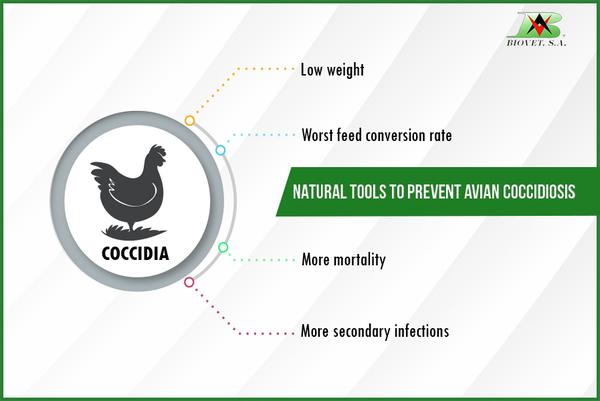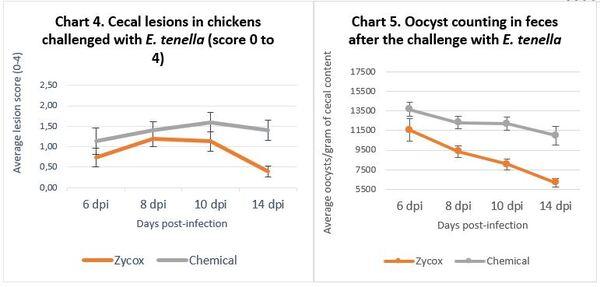Natural tools to prevent avian coccidiosis
Published: January 25, 2021
Source : Biovet Alquermes

Coccidiosis and its impact in poultry production
Coccidiosis is a very important parasitic disease for poultry farms and affects farms worldwide (Miguel, Asenjo, Ciria, Del Cacho, & Calvo, 2008). It causes digestive disorders, from subclinical or mild cases, with some diarrhea and a decrease of performance, to clinical outbreaks -moderate or severe- with severe diarrhea and high mortalities.
Even mild cases have severe economic consequences related to the weakening of the gut mucosa, which makes animals prone to suffer secondary infections, such as necrotic enteritis by Clostridium perfringens, and affects nutrient absorption and productive performance.
Coccidia species that parasite chickens belong to the Eimeria genus. The location of the lesions and severity of the clinical signs depend on the species involved. E. tenella and E. maxima are the two most relevant species in the world.
Conventional prevention mechanisms based on direct effects against parasites lose efficacy with time due to the development of resistances, and their administration has been limited in many countries (Miguel et al., 2008). On the contrary, intestinal optimizer pronutrients, which are natural molecules from plant extracts, help the animal to develop an effective protection against coccidiosis, without resistances (Borrell, 2005).
Coccidia resistances: conventional products lose efficacy, but natural mechanisms remain effective
The development of resistances gives rise to the lose of efficacy of conventional anticoccidial programs and is a challenge towards the control of coccidiosis in poultry. Conventional products have been already limited and/or banned in many countries and, in others where they are still permitted, the main producers are looking for alternatives that do not create resistances.
Intestinal optimizer pronutrients are an effective solution with long-term efficacy, even when administered in successive production cycles, because, instead of targeting the parasite, they improve the physiology of the bird’s immune cells, (Borrell, 2005; Borrell, Domenech, Martin, & Tesouro, 2016).
These pronutrients physiologically improve the functioning of the local immune system in the gut, so that birds can defend themselves against coccidiosis. Thanks to their metagenetic mechanism of action, which starts with the stimulation of specific genes, local immune cells in the digestive tract increase the expression of interleukins related to the immune response against coccidia. This way, when coccidia get into the digestive tract, animal’s immune cells rapidly eliminate the parasites, preventing them from finishing the reproductive cycle and damaging the digestive mucosa.
Pronutrients have been broadly studied in many in vitro and in vitro trials, such as the one summarized in charts 4 and 5, where experimentally-challenged chickens with E. tenella showed that pronutrients help to reduce oocyst counts and the severity of cecal lesions. Besides, the trial showed that a better protection against coccidiosis has a positive impact on performance: the group fed pronutrients weighted an average of 62 more grams per bird and obtained a 1.35% better feed conversion rate, compared to conventional coccidiostats.

Charts 4 and 5. Pronutrients (Zycox) group showed lower lesion scores and oocyst counts in all the trial, compared to conventional coccidiostats (Chemical).
Intestinal optimizer pronutrients, the natural solution to prevent avian coccidiosis
Coccidiosis is a strong challenge in poultry farms as it affects performance results and promotes the presence of digestive disorders, whether because of the direct consequences of the disease or secondary infections.
Conventional products are losing efficacy due to the development of resistances. For this, the use of natural solutions, such as intestinal optimizer pronutrients is increasing. These components were proved to be an effective tool to boost the animal’s resistance against coccidiosis. They do not create resistances, nor do they leave residues.
Field trials conducted in chickens show that pronutrients can control coccidiosis much more efficiently than conventional coccidiostats and improve weight by 62 grams/bird and FCR by 1.35%.
These molecules were studied, described and their application is patented by Biovet, S.A. They can be found in the market under the name Alquernat Zycox, available in premix (for feed) and liquid (for water) formulations.
Bibliography
Alcaíno, H., González, J. P., Fredes, F., & Gorman, T. (2002). Coccidias aviares de gallineros industriales de Chile. Parasitologia Latinoamericana, 57(1–2), 34–39. https://doi.org/10.4067/s0717-77122002000100009
Borrell, J. (2005). Uso de pronutrientes de origen natural en veterinaria. RACVE (Real Academia de Ciencias Veterinarias de España).
Borrell, J., Domenech, C., Martin, N., & Tesouro, A. (2016). Pronutrients use in poultry nutrition (S11-0224). In XXV World’s Poultry Congress (p. 97). Beijing, China. Retrieved from http://www.wpsa.com//images.engormix.com/downloads/tables_of_contents/The Proceedings of WPC2016-Abstracts-20160920.pdf
Espinosa, A. F. (2019). Identificación y cuantificación de Eimeria tenella, E. maxima y E. acervulina en heces de pollos y gallinas de traspatio (Gallus gallus domesticus) en la Provincia de Santo Domingo de los Tsáchilas, Ecuador. Trabajo de Grado presentado como requisito para obtener el título de méidoc veterinario y zootecnista. Universidad Central del Ecuador. Retrieved from https://www.bps.go.id/dynamictable/2018/05/18/1337/persentase-panjang-jalan-tol-yang-beroperasi-menurut-operatornya-2014.html
Miguel, J. A., Asenjo, B., Ciria, J., Del Cacho, E., & Calvo, J. L. (2008). Comparison of control methods for coccidiosis in native Spanish “Castellana Negra” chickens. Spanish Journal of Agricultural Research, 6(4), 531–536. https://doi.org/10.5424/sjar/2008064-347
Source
Biovet AlquermesRelated topics
Join to be able to comment.
Once you join Engormix, you will be able to participate in all content and forums.
* Required information
Would you like to discuss another topic? Create a new post to engage with experts in the community.
Create a post






.jpg&w=3840&q=75)